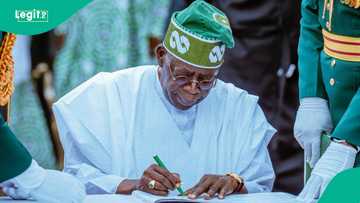Education Minister Alausa Unveils Sweeping Reforms as Digital Revolution Hits Nigerian Schools
- Nigeria’s education sector is undergoing one of its biggest shake-ups in years, as minister of education Dr Maruf Alausa drives a push for major reforms
- The ministry is rolling out smartboards, teacher training, and a new credential-verification system
- Education minister Alausa also explained the reason behind the recent reversal of the system
Abuja, FCT - Nigeria’s education sector is undergoing a wave of reforms as the minister of education, Dr Maruf Tunji Alausa, steers a rapid shift toward digital learning, streamlined curricula and data-driven policy.
Backed by the minister of state for education, Prof Suwaiba Ahmed, the ministry is positioning the system for what officials describe as “future-ready and inclusive learning.”
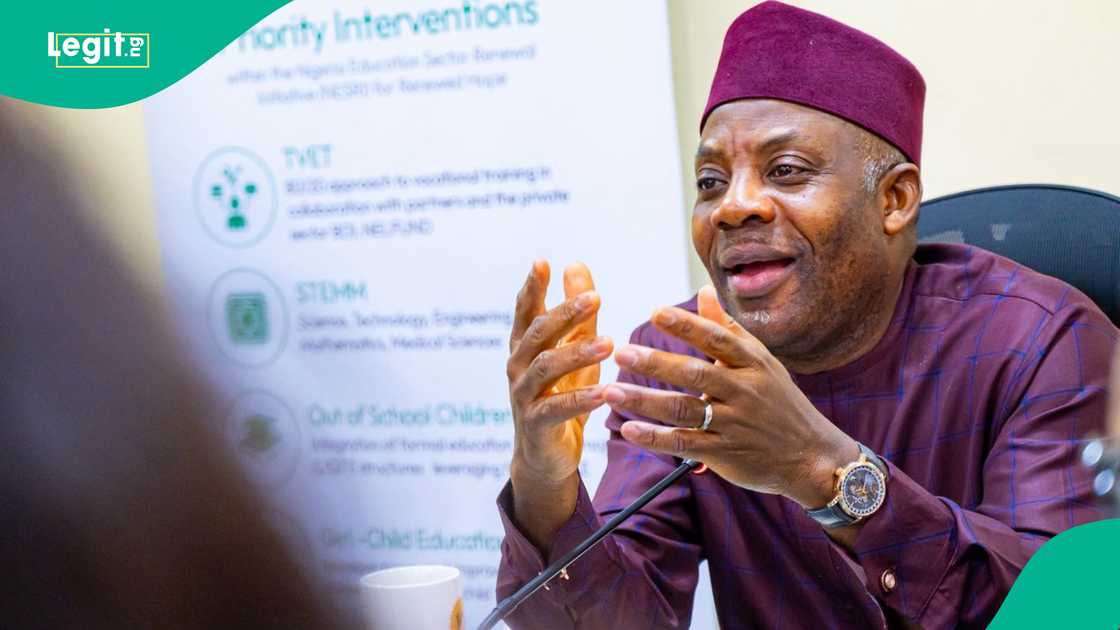
Source: Twitter
Alausa’s flagship push is a nationwide digital classroom initiative. In October, the ministry rolled out the National Smart Learning Initiative, distributing more than 800 interactive smartboards to public schools. The tools are intended to replace traditional chalkboard teaching with multimedia lessons designed to improve engagement and comprehension.
The effort is reinforced by a National EdTech Strategy and a “Zero-Rated Data and Devices” scheme that gives teachers in underserved communities free internet access and subsidised smart devices. Officials say the measures aim to reduce digital inequality and turn classrooms into connected hubs where access to information no longer depends on geography.
Alausa cracks down on certificate fraud
Beyond technology, Alausa has launched a campaign to clean up academic records and restore trust in Nigerian qualifications. Through the new Nigeria Education Repository & Databank (NERD), every certificate, transcript and diploma now carries a National Credential Number. The system allows instant verification by employers, schools and students and is designed to curb widespread certificate fraud.
“This is about credibility,” an official close to the project said. “We want Nigerian qualifications to be trusted anywhere in the world.”
Curriculum trimmed and skills prioritised
Curriculum reform has also taken centre stage. The government has reduced the number of subjects taught in schools while expanding practical components such as trade skills, digital literacy and civic education. Alausa has repeatedly argued that classrooms must produce problem-solvers, not just exam-takers.
“Our reforms must impact classrooms, teachers and learners directly,” the minister of education told stakeholders at a recent national education forum.
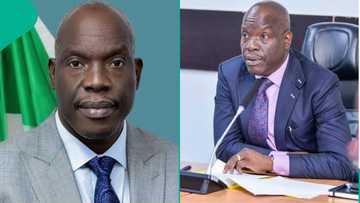
Read also
Nigeria’s big comeback: NUPRC’s 2025 oil licensing round ignites global investor confidence
Reversal of mother-tongue policy: Alausa explains
One of the most contentious decisions has been the reversal of the 2022 National Language Policy, which had required that early-grade pupils be taught in their mother tongue.
Among others, Professor Oyesoji Aremu of the Department of Guidance and Counselling at the University of Ibadan said the reversal of mother-tongue policy came as a surprise, especially at a time when several countries were adopting mother-tongue instruction in basic education. He told The Punch:
“The policy on the use of mother tongue as a mode of instruction in basic education was an outcome of the famous Ife Six-Year Primary Project and later became a Federal Government policy. Ghana just adopted a similar policy a few days ago."
However, citing performance data, Alausa reinstated English as the primary language of instruction nationwide. He said that states that implemented the mother-tongue policy saw lower examination results.
Critics worry the decision could weaken cultural identity, but the minister insists evidence must guide policy. Complementing the change, Prof Ahmed is expanding teacher-training programmes focused on foundational literacy and numeracy.
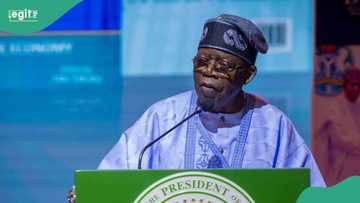
Read also
Breaking: Tinubu's govt approves official language that is accepted for teaching in all schools
Teacher training scaled up
Recognising that digital tools are only as effective as the teachers using them, the ministry has organised workshops and online training across several states. The aim is to help teachers adapt to interactive technologies and new teaching methodologies.
Alausa has also emphasised equity. Underserved regions, particularly in northern Nigeria, have been prioritised for device distribution, connectivity rollouts and teacher support. The ministry said the goal is to narrow long-standing educational disparities and ensure that reforms benefit all learners, not just those in urban centres.
Alausa deepens global partnerships to boost innovation
To strengthen implementation, the ministry has deepened ties with NGOs, international development partners and global tech companies.
These collaborations have supported pilot programmes in STEM laboratories, digital literacy and vocational training, bringing global best practices into local classrooms.
Meanwhile, the working relationship between Alausa and Ahmed has emerged as a notable dynamic of the reform period. While Alausa has focused on major policy shifts, digital strategy, curriculum redesign and credential integrity, Ahmed has concentrated on foundational learning and teacher preparedness. Ministry officials say the combination has created a balanced, long-term reform structure.

Read also
Nigeria launches Talent Accelerator to empower youth, close skills gaps, and create millions of jobs
From digital classrooms to verifiable credentials, the reforms underway mark one of the most significant transformations in Nigeria’s education system in years. Supporters argue that Alausa’s results-first approach is redefining what educational success looks like in the country.
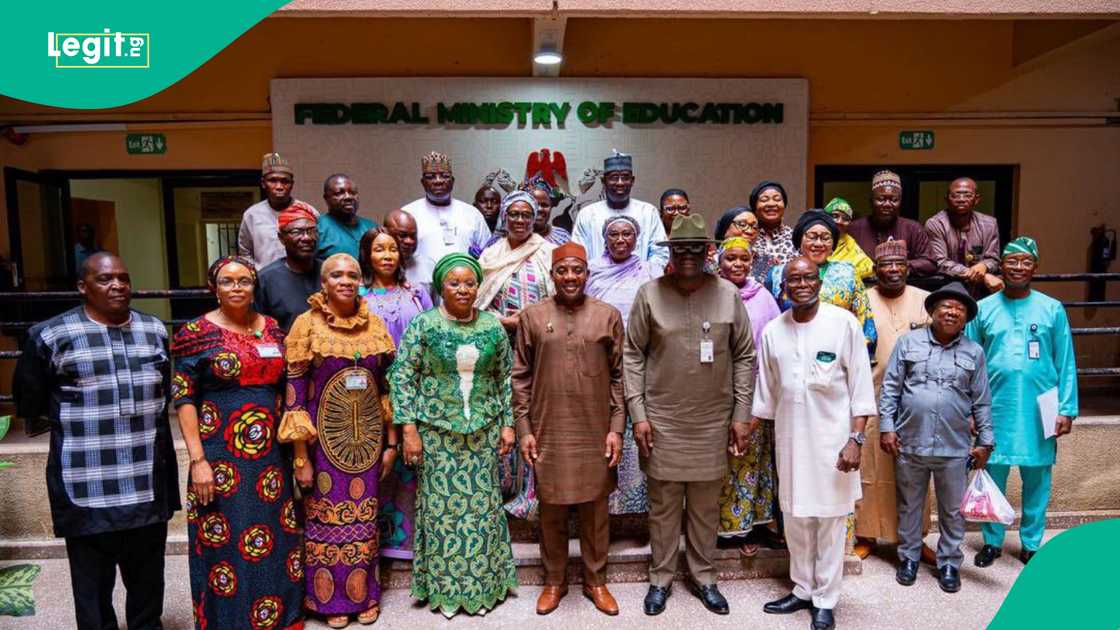
Source: Twitter
Whether these reforms endure will depend on funding, political continuity and buy-in from schools.
Education minister directed to end ASUU strike
Meanwhile, President Bola Ahmed Tinubu has directed Alausa to put an end to the ongoing Academic Staff Union of Universities (ASUU) strike.
ASUU has been at odds with the federal government over salary and promotion arrears for some years.
“The president has mandated us that he doesn’t want ASUU to go on strike, and we’re doing everything humanly possible to ensure that our students stay in school," the minister said.
Source: Legit.ng

